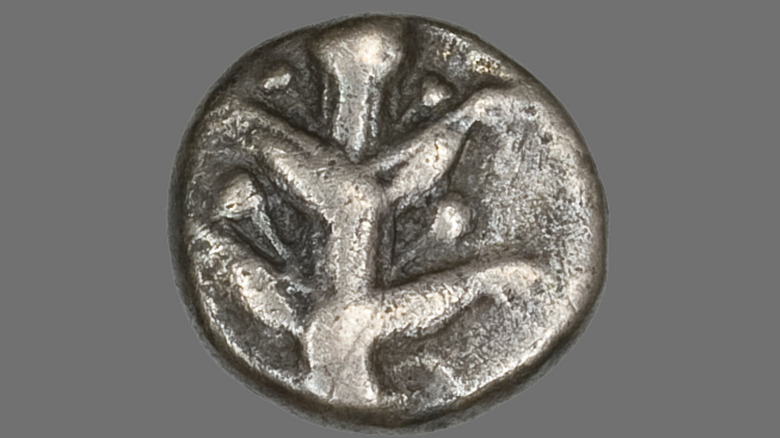The Extinct Herb Ancient Romans Put On Everything
Herbs and spices are kind of incredible. Throughout history, they have been considered sacred and used in religious ceremonies and medicinal work; as cure-alls and poisons. For example, nutmeg has been used for centuries to support the stomach and flavor foods (via National Library of Medicine). And some of our favorite herbs and spices, such as thyme and cinnamon, have chemical compounds that are toxic if consumed in concentrated doses but are suspected to be beneficial in smaller doses, according to Scientific American.
The Roman Empire was especially famous for using herbs as medicines and food enhancers (via Romano Britain). Garlic was a beloved cure for all kinds of ailments, but no herb was as regarded as Silphium. Native to the Mediterranean coast and homely in looks, Silphium was celebrated by every culture who knew of its versatile nature. So what was so great about this herb? And why don't we hear about it today?
Silphium in food and medicine
Silphium was an herb in Ancient Egypt and Rome that was used for everything... until it wasn't. The BBC claims its stalks were cooked, its roots were eaten raw, the small yellow flowers dotting the shrub were squeezed into perfume, and its sap was dried and grated over all sorts of dishes. Silphium was treated as a cure-all herb and is suspected to be the first effective birth control ever commonly used. It was so revered that the ancient city of Cyrene, which was once a part of both the Greek and Roman empires, had the plant's image pressed into its coins (via Royal Botanical Gardens).
One of the oldest cookbooks on record today was written by Roman merchant Marcus Gavius Apicius, who described how the ancient people used the sap of the Silphium fennel in sauces, bringing a parsley-like flavor to an already rich Roman cuisine (Britannica). The herb was versatile, used in elaborate dishes like braised flamingo, but also in everyday foods, like a Greek cabbage recipe that called for a simple dressing of vinegar and Silphium, which supposedly cured stomach aches, headaches, and even a nasty hangover, per the British Museum.
The fall of Silphium
Pliny the Elder, a student of Rome and author of his encyclopedic "Natural History," knew of the plant and claimed it was a cure for anything from snake bites to hemorrhoids, according to The Guardian.
How could the people of the time let such a well-renowned and useful herb go extinct? Well, when humans love something, they tend to exploit it. NPR explores this topic in an interview with Lenore Newman, food extinction expert and author of "Lost Feast." In her book, Newman claims that Silphium is one of many foods we loved to death, saying, "We need to be a little more thoughtful about how we eat." Because if we aren't more careful, some of our favorite foods might be on the chopping block.
But Paul Pollaro and Paul Robertson from the University of New Hampshire believe that in addition to overharvesting, the extinction of the Silphium herb was also aided by climate change (via The Guardian). Their research indicates that Rome's aggressive urban growth and deforestation damaged the Silphium's natural environment irreversibly and that even if people weren't recklessly reaping the herbs, the change in climate would have destroyed them anyway.


